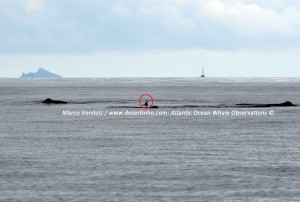Desertinho Atlantic Ocean – Deformed Atlantic bottlenose dolphin is “Nanny” for life in between a pod of sperm whales.
In Januari 2016 I had one of the most beautiful observations of my life concerning professional Atlantic Ocean whale observations in general. I met the famous sperm whale (Physeter macrocephalus) group where a “deformed” Atlantic bottlenose dolphin (Tursiops truncatus) acts, for at least 5 years, like a “Nanny” for their calves. This specific pod of sperm whales is really content with her presence that it seems they even made an alliance for life! During my observation of the sperm whale pod, together with the deformed Atlantic bottlenose dolphin, my focus was on the deformed Atlantic bottlenose dolphin and how she was acting in between the pod of sperm whales. The results are as follows: She was traveling, foraging, and even playing with both the adult sperm whales and their calves. During diving for food of the adult sperm whales, the “Atlantic nanny” obviously took care of the young sperm whale calves. This year I counted 3 young sperm whales within the pod where the “Atlantic nanny” was busy at the time with “baby sitting” them.
She learned this kind of behavior because these sperm whales share their food with her. It is really amazing to see such a special alliance in nature in between two different kind of whale species in the Atlantic. Do you wanna know why? Sperm whales are namely not that social in combination with other whale species. For now it seems they made an exception “for life” by adopting this deformed Atlantic bottlenose dolphin. Finally, I observed this sperm whale pod in the Atlantic Ocean near the island of Madeira (Portugal) and my photo below shows you the “Atlantic Nanny” in the centre of the sperm whale pod.
https://www.desertinho.com/potvis-adopteerd-een-dolfijn-kalf/
Desertinho Atlantic Ocean – Misvormde Atlantische tuimelaar is “Nanny/Oppas” voor het leven binnen een groep potvissen.
Januari 2016 was een maand waarin ik een bijzondere waarneming beleefde voor wat betreft Atlantic Ocean whale observations: Ik ontmoette “de” groep potvissen (Physeter macrocephalus) welke een “misvormde” Atlantische tuimelaar (Tursiops truncatus) hebben opgenomen in hun groep. De misvormde Atlantische tuimelaar reist tenminste al sinds 2011 samen met deze groep potvissen door de Atlantische Oceaan waarbij ze de functie van “nanny/ oppas” heeft. Deze groep potvissen is al jaren tevreden over haar aanwezigheid binnen de familie waardoor het lijkt dat ze een samenwerking verbond hebben gesloten voor het leven. Tijdens mijn observatie lag mijn focus specifiek op het gedrag van de misvormde Atlantische tuimelaar binnen de groep potvissen. Haar gedrag was heel bijzonder om te zien en dan met name vanwege het veelvuldige lichamelijke contact dat ze zocht met alle potvissen. Haar positie was continue in het midden van de groep maar vooral dichtbij bij de jonge potvissen. Samenvattend zijn de resultaten van deze bijzondere waarneming als volgt: Deze Atlantische tuimelaar reist tenminste al 5 jaar mee met deze groep potvissen, haar misvormde lijf is daarbij geen belemmering, en ze blijft vooral dichtbij de jonge walvissen van de groep. Wat ook bijzonder goed te zien was is dat ze haar rol van “Nanny/oppas” direct oppakte toen de volwassen potvissen weg doken op zoek naar voedsel. Op dat moment bleef ze direct dicht in de buurt van de 3 jonge potvissen die aan het wateroppervlak achterbleven.
Deze misvormde Atlantische Tuimelaar heeft zichzelf dit gedrag aangeleerd omdat ze zelf niet in staat is om te jagen naar vis, laat staan om mee te komen met haar eigen soortgenoten. Potvissen zwemmen een stuk trager en deze groep potvissen laten de resten van hun eigen voedsel speciaal bovendrijven voor haar. Wat deze waarneming ook zo bijzonder maakt is om te zien dat twee verschillende walvissoorten met elkaar een samenwerking verbond zijn aangaan en dat is vooral bijzonder te noemen voor de potvis. Potvissen zijn over het algemeen niet zo sociaal met andere walvissoorten maar voor deze keer lijkt deze groep potvissen een uitzondering te hebben gemaakt. Tot slot, ik deed deze waarneming op de Atlantische Oceaan in de buurt van het eiland Madeira (Portugal). Op de foto hierboven kun je de Atlantische “nanny” precies in het midden van de groep potvissen zien.
